|
|
|
Sort Order |
|
|
|
Items / Page
|
|
|
|
|
|
|
| Srl | Item |
| 1 |
ID:
077018
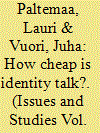

|
|
|
| 2 |
ID:
151816
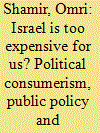

|
|
|
|
|
| Summary/Abstract |
All over the world, political consumerism is on the rise and so is the number of studies. Until the summer of 2011, the use of consumer power in Israel was very limited and political scientists did not focus on it enough. But the social protest and the cottage cheese boycott during that summer were a different experience. Analysing this boycott as a case study, the paper examines the question “Why do political entrepreneurs, the boycott organizers, choose to adopt political consumerism as their main political strategy in order to create a social and political change?” Based on the neo-institutional theory and on the principles of the rational choice theory, the study offers the “triangle of political consumerism’s model” which explains the interaction between the entrepreneur, the “Israel is too expensive for us” (Israel Yekara Lanu) consumer movement, the food corporations, citizens as consumers and the state.
|
|
|
|
|
|
|
|
|
|
|
|
|
|
|
|
| 3 |
ID:
175567
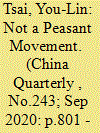

|
|
|
|
|
| Summary/Abstract |
In contrast to popular opinion, this paper suggests that recent protests against the Taiwanese government's expropriation of farmland for high-tech development in Taiwan do not constitute a peasant movement. Based on Karl Polanyi's double-movement thesis and Ching Kwan Lee's analysis of workers’ uprisings in the context of market reform, this paper shows that the local cause of such a mobilization is the labouring population's struggle to maintain a livelihood against increasing economic and employment insecurity. Moreover, the intensification of market despotism, economic insecurity and the relocation of firms to China have broken the various promises offered by high-tech development. As a result, local protestors have begun to question the necessity of expropriating farmland to make way for the construction of new science industrial parks.
|
|
|
|
|
|
|
|
|
|
|
|
|
|
|
|
| 4 |
ID:
178761
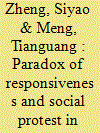

|
|
|
|
|
| Summary/Abstract |
Prior studies regard responsiveness as an effective institution for Chinese government to mitigate social protests based on the premise that citizens adopt more institutionalized channels as soon as the regime makes it available. We challenge this notion by arguing that institutionalized and noninstitutionalized channels are not substituting but complements, and improving responsiveness to institutionalized participation may ironically lead to more protests. We collected a unique dataset and employed machine-learning to measure the quality of local responsiveness. We find that improving responsiveness has a positive effect on protests and identify updating citizens’ beliefs on repression as major mechanism. The findings suggest the availability of new institutionalized channels may not have the intended substitutive effects on noninstitutionalized participation, and thus authoritarian co-optation could have unintended consequences.
|
|
|
|
|
|
|
|
|
|
|
|
|
|
|
|
| 5 |
ID:
136295
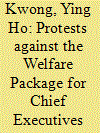

|
|
|
|
|
| Summary/Abstract |
In recent years, a series of social protests such as the “Sunflower Student Movement”inTaiwan and the “Umbrella Movement”in Hong Kong have sparked concerns over the political atmosphere in the Greater China Region.Compared withTaiwan and Hong Kong,the people of Macao have long been considered politically apathetic,with a low level of political awareness and efficacy. When asked whether they would oppose the government if their interests had been seriously infringed, around 40% of respondents chose to remain silent, perhaps out of a desire for“social harmony,”whereas 92.1% had no experience of engagement in any social movement. (1) It therefore came as a surprise when 20,000 people took to the streets on 25 May 2014 to protest against a bill that would have given generous benefits packages to outgoing Chief Executives (CEs) and top officials. In what was regarded as the biggest march since the 1999 handover, this exceptional scenario reveals the existence of a civic culture among the youth of Macao.
|
|
|
|
|
|
|
|
|
|
|
|
|
|
|
|
| 6 |
ID:
130446
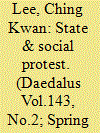

|
|
|
|
|
| Publication |
2014.
|
| Summary/Abstract |
This essay sketches an array of cultural, political, and bureaucratic mechanisms that mediate the Chinese Communist state's relationship with the major types of social protests, in the process exploring how governance and contention have transformed each other in the past six decades. In particular, it spotlights a noteworthy development in recent years: the increasingly salient market nexus between state and protest. While the regime response of making economic concessions to protesters is hardly unique in the context of China's own past, the transition from top-down mandated concession to pervasive bargaining between the state and protesters is a significant break with past patterns. The negotiability of cash and material rewards insinuates a market logic of governance that is made all the more poignant by the singularly formidable fiscal and infrastructural capacities of the current Chinese regime among its authoritarian counterparts worldwide.
|
|
|
|
|
|
|
|
|
|
|
|
|
|
|
|
| 7 |
ID:
129323
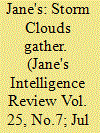

|
|
|
| 8 |
ID:
161389
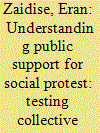

|
|
|
|
|
| Summary/Abstract |
Despite its acclaimed role in democratic theory, social protest is not a common occurrence in most states where widespread political participation is typically limited to voting, and mass participation is otherwise rare. This article examines public opinion regarding the 2011 summer protests in Israel, in which hundreds of thousands took to the streets in wide-scale events that lasted for several weeks. It does so by focusing on two independent samples, one of university undergraduate students and the other of active protesters, totaling 59 respondents. Findings suggest that support for the protest most strongly affiliated with concerns of social injustice coupled with the belief that government responsible for this state of affairs.
|
|
|
|
|
|
|
|
|
|
|
|
|
|
|
|
| 9 |
ID:
125135
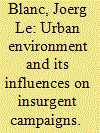

|
|
|
|
|
| Publication |
2013.
|
| Summary/Abstract |
For a long time, insurgency was a rural affair. The growing modernization of the modern world, however, shifts conflicts to the cities and requires us to explore the logics of armed struggle in urban environments. This article explores how the urban environment shapes armed conflicts, and argues that insurgents face severe practical constraints when acting in the cities. The urban environment offers the insurgents alternative ways of financing and of operating while close state control impedes them in pursuing a classic strategy of insurgency. Although state control cannot prevent attacks as such, it particularly hampers insurgents in relating to the population and organizing opposition. However, without massive and active support, armed struggle will remain sectarian and, thus, fail to achieve major political changes. This article argues that urban insurgents face a paradoxical relationship with society. While urban insurgents become independent of social support on an operational level, they depend more than ever on spontaneous massive and active social support on a strategic level.
|
|
|
|
|
|
|
|
|
|
|
|
|
|
|
|
| 10 |
ID:
130514
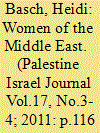

|
|
|
|
|
| Publication |
2011.
|
| Summary/Abstract |
The 100"' Anniversary of lnternational Women's Day on March 8"' was marked around the Middle East by only a small number of events, according to the International Women's Day (IWD) 20]! website. in stark contrast to other parts of globe. Nonetheless, the consistent and visible participation of women in the popular protests which have swept the region during 201 l puts paid to the long-held image ol' Middle Eastern women as passive and powerless beings. What this means regarding the struggle to improve the status of women in the region remains to be seen. As in the rest of the world, the struggle for women's rights in the Middle East is ongoing. Arguably, though, the region poses especially formidable challenges. Nowhere else are the gains already achieved so precarious, or as reliant upon a particular regime and its ability to steer power away from forces opposed to expanding women's rights. The 1979 Iranian Revolution provides prime evidence to that effect: In its aftermath, women ofall social classes, religious backgrounds and political ideologies were Forced to conform to restrictive socio~political and economic roles dictated by Ayatollah Khomeini and his supporters.
|
|
|
|
|
|
|
|
|
|
|
|
|
|
|
|
|
|
|
|
|